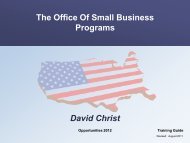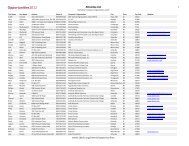Capital Opportunities for Small Businesses - sbtdc
Capital Opportunities for Small Businesses - sbtdc
Capital Opportunities for Small Businesses - sbtdc
You also want an ePaper? Increase the reach of your titles
YUMPU automatically turns print PDFs into web optimized ePapers that Google loves.
C A P I T A L O P P O R T U N I T I E S F O R SMA L L B U S I N E S S E S<br />
important considerations. All owners having 20 percent or more ownership in the company are<br />
required to personally guarantee SBA loans.<br />
Restrictions on Eligibility of <strong>Businesses</strong><br />
The vast majority of businesses are eligible <strong>for</strong> financial assistance from the SBA. However, applicant<br />
businesses must operate <strong>for</strong> profit, have reasonable owner equity to invest, and use alternative<br />
financial resources (including personal assets). Also, the business must be engaged in, or propose to do<br />
business in, the United States or its possessions.<br />
Specific types of businesses not eligible include:<br />
<br />
<br />
<br />
<br />
<br />
<br />
<br />
<br />
<br />
<br />
Real estate investment and other speculative activities<br />
Lending activities<br />
Pyramid sales plans<br />
Illegal activities<br />
Gambling activities<br />
Charitable, religious, or certain other non-profit institutions<br />
Life insurance companies<br />
<strong>Businesses</strong> located in a <strong>for</strong>eign country<br />
<strong>Businesses</strong> primarily engaged in political or lobbying activities<br />
Speculative business (such as oil exploration)<br />
The <strong>Small</strong> Business Act defines an eligible small business as one that is independently owned and<br />
operated and not dominant in its field of operation. The SBA has developed size standards that define<br />
the maximum size of an eligible small business. These, however, represent general industry guidelines<br />
and depend on NAICS classification applicable to the business.<br />
Industry Size Limitations:<br />
Not to Exceed:<br />
Retail<br />
Service<br />
Construction<br />
Agriculture<br />
Wholesale<br />
Manufacturing<br />
$7.0 to $35.5 million in revenues<br />
$2 to $35.5 million in revenues<br />
$7.0 to $33.5 million in revenues<br />
$0.75 to $17.5 million in revenues<br />
fewer than 100 employees<br />
500 to 1,500 employees<br />
7(a) loans have a maximum loan amount of $5 million. SBA does not set a minimum loan amount.<br />
The proceeds of SBA loans can be used <strong>for</strong> most business purposes. These may include the purchase of<br />
real estate to house the business operations; construction, renovation, or leasehold improvements;<br />
acquisition of furniture, fixtures, machinery, and equipment; purchase of inventory; and working<br />
capital.<br />
The proceeds of SBA loans cannot go towards the following: refinancing existing debt where the lender<br />
is in a position to sustain a loss and the SBA would take over that loss through refinancing; providing<br />
35









